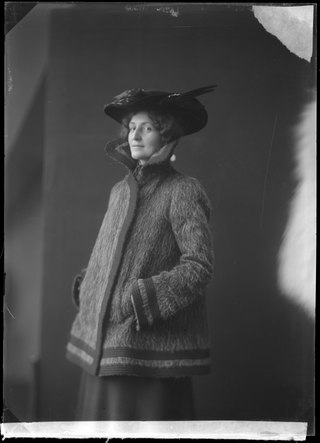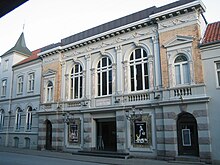
Denmark competed at the 1992 Summer Olympics in Barcelona, Spain. 110 competitors, 77 men and 33 women, took part in 67 events in 14 sports.

Assistens Cemetery in Copenhagen, Denmark, is the burial site of many Danish notables as well as an important greenspace in the Nørrebro district. Inaugurated in 1760, it was originally a burial site for the poor laid out to relieve the crowded graveyards inside the walled city, but during the Golden Age in the first half of the 19th century it became fashionable and many leading figures of the epoch, such as Hans Christian Andersen, Søren Kierkegaard, Christoffer Wilhelm Eckersberg, and Christen Købke are all buried here.

Poul David Reichhardt was a Danish actor, well known for his roles in Danish 1940s/1950s comedies. Later on, he also played more serious and varied roles; he has also starred in Huset på Christianshavn, Matador and as various minor characters in the Olsen-banden films.

Det Ny Teater is an established theatre in Copenhagen, Denmark, first opened in 1908. It is based in a building which spans a passage between Vesterbrogade and Gammel Kongevej in Copenhagen's theatre district on the border between Vesterbro and Frederiksberg.
The Invisible Army is a 1945 Danish war film directed by Johan Jacobsen and starring Bodil Kjer.
Events from the year 1988 in Denmark.
Gudmund Nyeland Brandt was a Danish landscape architect who was internationally renowned.

Agnes Mowinckel was a Norwegian actress and theatre director. Born in Bergen into a distinguished family, she became Norway's first professional stage director. A pioneer in bringing painters to the theatre, she used light as an artistic element, and engaged contemporary composers. She took part in theatrical experiments, worked at small stages in Oslo, and founded her own theatre.

Folketeatret is a theatre in Copenhagen, Denmark. The theatre was founded in 1857, after an initiative from actor and theater director Hans Wilhelm Lange (1815-1873) who managed the theater until his death in 1873. Folketeatret is now operated as a part of the Københavns Teater in affiliation with the Betty Nansen Teatret, Østre Gasværk Teater and Nørrebros Theater.

Betty Nansen Teatret is a theatre situated on Frederiksberg Allé in the Frederiksberg district of Copenhagen, Denmark. It takes its name from the actress Betty Nansen, who managed it from 1917 until her death in 1943.

Olaf Heine Johannessen, is a highly acclaimed Faroese actor known for his versatile acting skills and remarkable performances. Born on 8 July 1961 in Tórshavn, Faroe Islands, Olaf grew up in a family of actors with both his father, Eyðun Johannessen, and mother, Tove Johannessen born Jacobsen, being prominent figures in the Faroese theater scene. He studied at the Danish National School of Theatre in Odense and began his acting career in Aarhus Theatre. He later became a member of the ensemble at the Royal Danish Theatre. He has played a variety of roles, including the lead roles in "Hamlet", "Faust", “Mephisto” and “Puntila” among others.
The Reumert Award is an annual Danish awards ceremony to recognize excellence in theatre achievements in Denmark. The award was founded by the Bikuben Foundation in 1998, and has been handed annually since then. There are 16 award categories as well as 10 talent awards. A jury of ten specialists in theatre selects the recipients, who receive a statuette and a prize. As of 2016, the recipients also receive an amount of money. The recipients of the Reumert Award of Honour receive DKK 200,000, the recipients of the Talent Prize receive DKK 35,000 and all other categories-recipients receive DKK 40,000. The Reumert prize is named after the Danish actor Poul Reumert (1883–1968).

Svend Melsing was a Danish stage and film actor, theatre director and playwright whose career spanned nearly forty years.
Brigitte Käthe Kolerus (1941–2001) was an Austrian-born Danish actress who performed in films and on television but mainly on stage. After studying at the Odense Teater drama school, she appeared in the musical Man of La Mancha at Ungdommens Teater in 1967 and went on to play Desdemona in Shakespeare's Othello at Det Danske Teater in 1969. She made a name for herself in films by appearing in erotic scenes in Erik Frohn Nielsen's Ekko af et skud in 1970. Kolerus also served as director of Copenhagen's Teatret ved Sorte Hest from 1978 and staged plays and operas at a number of venues.
Kirsten Eli Lehfeldt is a Danish actress. After studying at the Aarhus Theatre School she appeared on stage in theatre productions and in a variety of reviews as a comic. In 1980, with her slim figure and penetrating singing voice she gained success in Aalborg in the title role of Piaf representing the French singer Edith Piaf. In 1986, Lehfeldt made her film debut as the nurse Henriette in Helle Ryslinge's Flamberede hjerter, earning the prized Bodil Award for best actress. She has recently appeared in the comic Danish TV series Carmen Curlers and Guru. Since her partner Stig Hoffmeyer died in 2022, she has continued performing the role of Gerda in the TV series Minkavlerne, now in its fourth year.









